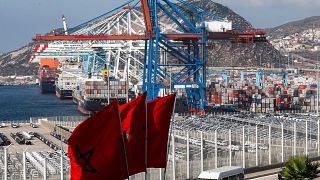Nigeria
Hundreds of heavy duty trucks have remained stuck on roads in Nigeria's economic capital Lagos, as they wait to get access into the Tin Can Island port.
The congestion, which is almost crippling operations at the Lagos TinCan port, has compelled some shipping lines to divert Nigeria-bound cargoes to neighboring ports in Cotonou and Cote D’ Ivoire according to Nigerian Ports Consultative Council.
A long-running crisis at the Apapa and Tin Can Island ports Lagos, the main commercial entry points into Africa’s largest economy Nigeria, has been worsened by the pandemic-induced economic slump.
With the then imposed lockdown and many curfews, dock labour was hampered, lowering productivity and extending the long stays of the vessels.
But some experts say the port congestion is caused by even more factors that include ageing infrastructure, meagre rail transport that forces around 90 per cent of cargo to go by road and an almost complete lack of automation.
As port congestion worsens, cost of shipping containers is reported to have risen by 600%.
Meanwhile, Nigeria reopened its border with Benin In December 2020, but heavy-goods vehicles are reportedly still not making cross-border trips.
The Africa Continental Free Trade Area agreement came into effect on January 1 but many Nigerian businesses have complained that higher costs make it hard for them to compete.
Around the world, the coronavirus pandemic has strained international supply chains and threatened to disrupt trade.










00:52
Nigeria's former president Buhari laid to rest in his hometown of Daura
01:00
Pix of the Day: July 15, 2025
02:03
Muhammadu Buhari's legacy: higlight of his presidential tenure
00:55
Nigerian security forces kill 30 gunmen in counter-attack in northwest
Go to video
U.S. slashes visa duration for some African nationals amid policy shift
Go to video
Nigeria snubbed at White House summit, opposition blames Tinubu